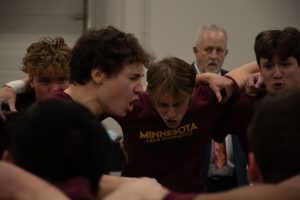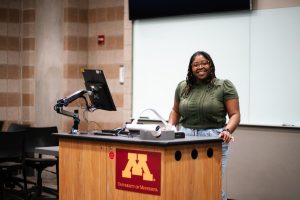Minnesota gubernatorial candidates began vying for student support last night when four of the five announced candidates participated in a panel discussion at the St. Paul Student Center.
“I think we have to ask of ‘Generation X,’ are they failing the system, or is the system failing them?” said Democratic candidate Ted Mondale. The theme of the round-table discussion, which was sponsored by the Youth Development Leadership Program of the Department of Education, was “youth issues.”
Democrats Mondale and Hennepin County attorney Michael Freeman, and Republicans Allen Quist and Sen. Roy Terwilliger, took part in the discussion. Minnesota’s attorney general, Democrat Hubert “Skip” Humphrey, was not able to attend because he was receiving an award from the College of Education.
In introducing themselves, candidates pointed out their similarities. All have children, and all have served, or in Terwilliger’s case currently serves, in the state Legislature.
However, differences quickly became apparent with the first question, which concerned welfare reform. On this issue, the hopefuls divided along party lines. Quist and Terwilliger stressed the need for personal responsibility and preventive measures, while Freeman and Mondale discussed the duty of the government.
“I view this as a great opportunity,” Terwilliger said. “I believe that it is time that we make the change in our society where we roll back the dependency that has built up over a multi-generational period of time and give people the opportunity to … see the tried-and-true American value of hard work.”
Freeman described a more liberal conception of the welfare system. “Every child deserves an opportunity to grow and develop to his or her best ability,” he said. “I think that’s our challenge in government.”
Candidates were asked a list of questions from members of the Youth Development Leadership Program. Each had two minutes to answer the question, then an additional minute to answer a follow-up question or to contest the comments of another candidate.
In the second half of the discussion, members of the audience posed questions, and each candidate had one minute to respond.
Another contentious issue was perceptions of juvenile crime and societal attempts to curb it.
Mondale said he was not necessarily opposed to policies like of one recently adopted by the Mall of America, which requires children under 15 to be escorted by adults on Friday and Saturday nights. Although we must be careful not to get carried away, he said he would need to review such cases individually.
Both Mondale and Terwilliger questioned whether it is the government’s place to interfere with such policies. “People should be able to draw a line and say there are rules,” Terwilliger said.
However, Quist took an opposing stance, equating such policies with discrimination. As an example, he drew upon the experiences of his daughter, who he said protested when her teacher punished the class for the actions of two troublemakers.
“It’s positively wrong to discriminate against a whole group because of what one or two people are doing or because of what a small group is doing,” he said. “If you’ve got crime problems, go after the perpetrators.”
The panel also discussed access to higher education. Freeman criticized Republican Governor Arne Carlson’s attitudes toward education.
“We have to stop beating (higher education) up, like the current governor has been for so damn long,” he said. Carlson has been especially critical of the University in the past year, faulting its handling of tenure reform and the regents selection process.
About 40 people attended the discussion. Afterward, coordinators of the event agreed that no particular candidate “won” the discussion, and that such competition was not the point of the panel discussion.
“We just wanted to hold a discussion about youth issues that we felt were critical,” said Deb Salls, one of the coordinators of the event. “We wanted to find out about how the candidates felt about particular issues, but we also wanted to bring to their attention issues that we felt were important.”








